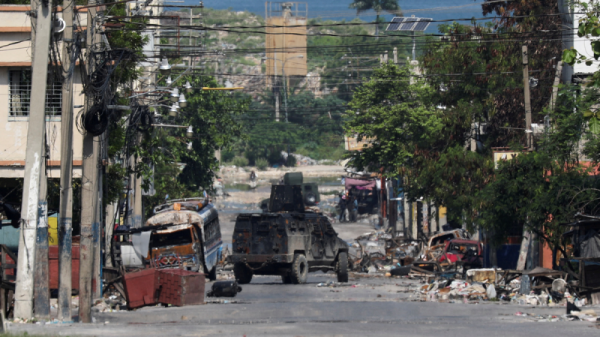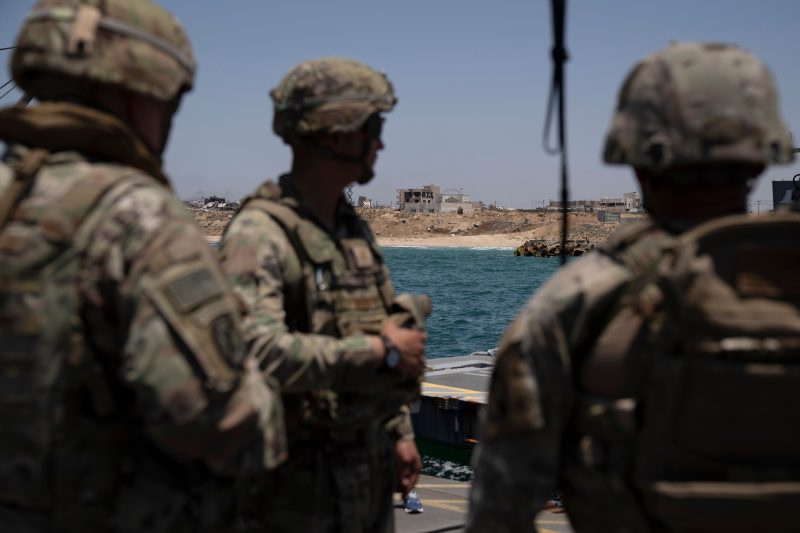The Pentagon on Wednesday declared an end to its sea-based humanitarian mission off Gaza, an effort that enabled delivery of millions of pounds of food to the war-ravaged territory even as the floating pier built by U.S. troops faced near-constant setbacks and ultimately fell short of expectations.
“The maritime surge mission involving the pier is complete,” said Vice Adm. Brad Cooper, the No. 2 officer at U.S. Central Command, which coordinates all U.S. military activities in the Middle East. The operation will shift to the Israeli port in Ashdod, located north of Gaza, where U.S. personnel will continue to facilitate the movement of aid arriving on ships dispatched from Cyprus, he added.
It remains to be seen whether the new operation at Ashdod will be more effective than the floating pier, which was sidelined repeatedly, or quell concerns among U.S. officials and aid groups who have urged Israel to loosen its chokehold on what may enter Gaza by land. The safety of humanitarian workers responsible for ensuring Palestinians can access the shipments has been a major impediment as well, as ongoing fighting between Israel and Hamas — and the war’s staggering civilian toll — has paralyzed distribution efforts.
To date, about a million pounds of aid has moved from Ashdod in a “proof of concept,” Cooper said, with millions of pounds more expected to follow.
Cooper called the 20 million tons of aid that arrived in Gaza via the pier “the largest volume of human assistance ever” delivered to the Middle East. Humanitarian groups have characterized it as a fraction of what is needed to address the hunger crisis there.
President Biden announced the mission in March, after Israel rebuffed his and other leaders’ demands that more land routes be opened for aid deliveries. At the time, Pentagon officials forecast that the floating pier would help provide up to 2 million meals per day. Citing an estimate provided by the U.S. Agency for International Development (USAID), which helps coordinate the humanitarian groups working in Gaza, officials said Wednesday that, in all, the volume of aid brought in over the pier was enough to feed a half-million Gazans for a month.
Biden, speaking during his State of the Union address, said the scope of suffering and starvation in Gaza made the U.S. mission a moral necessity, and he stressed that no U.S. troops would go ashore — seemingly attempting to find a tenuous balance between putting Americans in harm’s way and idly standing by as famine compounded the war’s civilian toll.
Once underway, the operation, with an estimated cost of more than $200 million, faced myriad complications. Consistently rough seas battered and damaged the structure, forcing it to halt operations again and again. Crucially, the aid groups expected to distribute the food once it reached land were reluctant to do so, citing persistent safety fears.
In all, the pier was operational for more than 20 days, Cooper said. It was last functional in late June. Deliveries began May 17, meaning it was in service about a third of the time.
Officials are confident the humanitarian mission’s move to Ashdod will be a viable solution, said Sonali Korde, a top USAID official, though she acknowledged that obstacles will remain.
“The key challenge we have right now in Gaza is around the insecurity and lawlessness that is hampering the distribution once aid gets into Gaza and to the crossing points,” she told reporters.
At a news conference last week, Biden said he was “disappointed that some of the things I put forward have not succeeded. Of the floating pier specifically, he said, “I was hopeful that would be more successful.”
Sen. Roger Wicker (Miss.), the Senate Armed Services Committee’s top Republican and a frequent critic of the president, seized on Wednesday’s announcement. The mission, he said, was “a national embarrassment.”
Wicker and other GOP lawmakers had warned since its inception that the pier’s deployment, along with the roughly 1,000 troops needed to build and operate it, would present U.S. adversaries in the region with an opportunity to attack. Those fears proved unfounded.
In a statement, the senator said it was a “miracle that this doomed-from-the-start operation did not cost any American lives.”






































